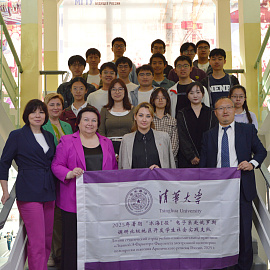Students of Tsinghua University (China) Study Arctic Experience at MAU
A delegation of one of the world's leading universities, Tsinghua University (PRC), visited Murmansk Arctic University. The group consisted of 16 students and 2 scientific advisers who have arrived in the capital of the Arctic to undergo educational training focused on exploring and researching the development of the Arctic region. The visit underscores commitment to strengthening scientific and educational bonds between Russia and China.
The guests received a warm welcome at MAU's main building, with Anna Golovina, Deputy Governor of Murmansk Oblast, speaking on behalf of the regional authorities. In her speech, Deputy Governor emphasised the strategic importance of cooperation:
«It is an honour for us to host a delegation from one of the world's top-ranked institutions, Tsinghua University, which is also the alma mater of Chairman Xi Jinping,» said Anna Golovina. «The focus of this study tour — research into the exploration and development of the Arctic — is particularly important today. We are interested in fostering Russian-Chinese relations, expanding the scope of interaction between our universities, including joint research projects. Going forward, we plan for students from MAU to visit the People's Republic of China as part of academic exchange programmes.»
Acting rector of MAU Maria Knyazeva presented the University as a pivotal scientific and educational centre in Russia's Arctic Zone, created by merging of two leading regional higher education institutions. Maria highlighted MAU's unique research infrastructure, about which the Chinese delegation had the opportunity to learn:
«Today's meeting marks an important step towards international scientific and educational cooperation in the Arctic. Our research laboratories demonstrate potential for cutting-edge collaborative studies. I am confident that this visit will lay solid foundations for long-term, mutually beneficial partnership. We are open to dialogue and eager to work together, ensuring that knowledge and technology contribute to progress and prosperity in both countries,» noted Maria Knyazeva.
Insights into MAU Research Landscape:
During their stay, the delegates experienced first-hand about several innovative projects:- Research laboratory «Monitoring and Preservation of Natural Ecosystems in the Arctic» presented a project on using phytoremediation techniques to extract heavy metals from wastewater at Kovdor Mining and Processing Plant using unique hyper-accumulator plants such as Iris pseudacorus and Bergenia crassifolia. Additionally, the delegates saw digital cadastre systems developed for rare plant species in the Rybachy and Sredniy Parks.
- Through presentations from the Research laboratory «Computer Modelling of Physical Processes in Near-Earth Environment», Chinese students learned about the Global Upper Atmosphere Model (UAM), co-developed with German institutes. This model plays a critical role in predicting space weather and ensuring safety in the Arctic.
- Information Technologies Department and Research laboratory «Data Analysis and Artificial Intelligence in Arctic Research» presented impressive student-led AI-driven monitoring projects covering vegetation tracking, ice edge detection, oil spill identification, air quality control, and rapid forest fire detection.
- During visits to the Research laboratory «Chemistry and Technology of Marine Bio-resources», the delegation was introduced to advanced technologies for deep processing of aquatic bio-resources used in food, cosmetics, and pharmaceutical industries, along with waste management solutions for fisheries.
- Visiting the Aquatic Complex, the guests explored a diverse array of Arctic fish, molluscs, and crustaceans native to the Barents Sea. They also observed high-tech Closed Water Supply Systems, designed to cultivate warm-water species under extreme northern conditions.
- Representatives from Tsinghua University also learned about large-scale cooperative projects conducted jointly by MAU Apatity Branch and PhosAgro Company. These initiatives are geared towards preparing highly skilled personnel for mining industry, integrated into real-world R&D initiatives.
Future Collaboration Prospects:
Both sides discussed specific directions for future collaboration during the visit. These include joint research in arctic technology, ecology, sustainable development, bioprocessing, remote sensing, space weather forecasting, climate change mitigation; academic exchanges for students and faculty members; cultural and sports activities involving participation in the «Arctic Longevity School» applied research into media content adaptation strategies and prompt-engineering; and expanded opportunities for Chinese students studying at MAU.This visit by the prestigious Tsinghua University delegation, renowned globally for its expertise in information technology and engineering, highlights China's increasing interest in Russia's experience in Arctic exploration and reinforces the bridge of scientific and educational cooperation between the two nations.
More photos — in VK album

